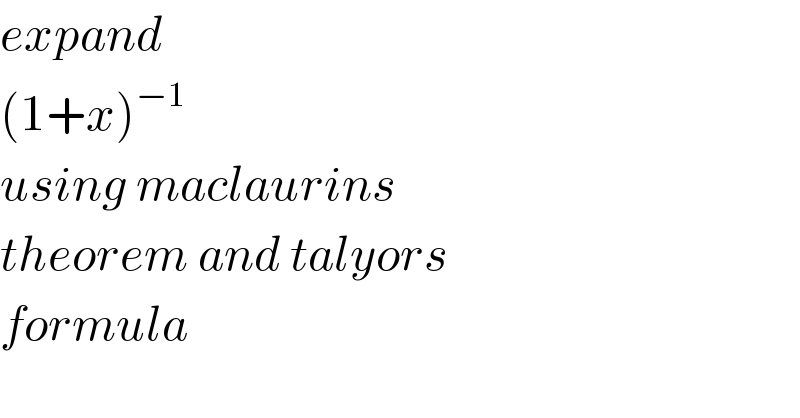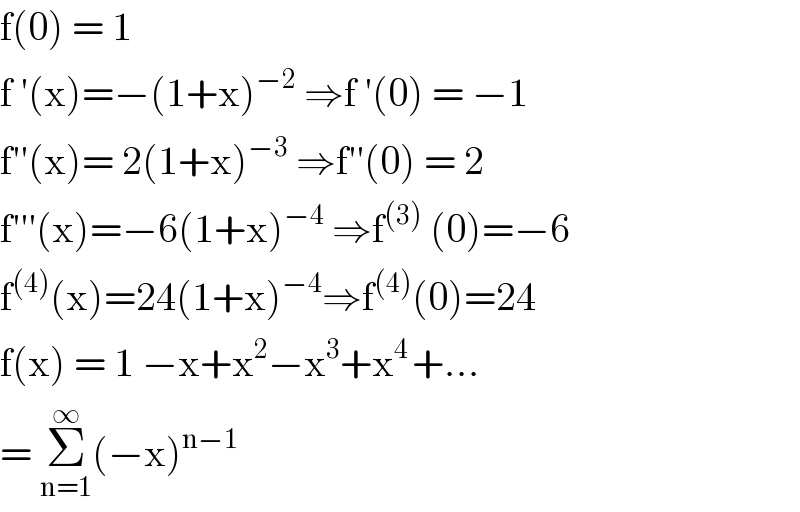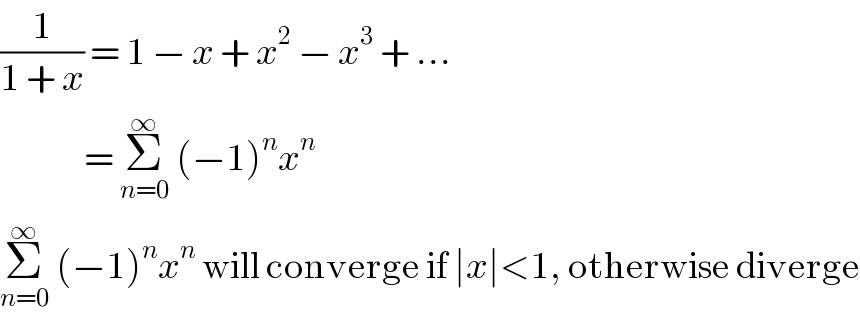
Question Number 87245 by redmiiuser last updated on 03/Apr/20

$${expand}\: \\ $$$$\left(\mathrm{1}+{x}\right)^{−\mathrm{1}} \\ $$$${using}\:{maclaurins} \\ $$$${theorem}\:{and}\:{talyors} \\ $$$${formula} \\ $$
Commented by jagoll last updated on 03/Apr/20

$$\mathrm{f}\left(\mathrm{0}\right)\:=\:\mathrm{1} \\ $$$$\mathrm{f}\:'\left(\mathrm{x}\right)=−\left(\mathrm{1}+\mathrm{x}\right)^{−\mathrm{2}} \:\Rightarrow\mathrm{f}\:'\left(\mathrm{0}\right)\:=\:−\mathrm{1} \\ $$$$\mathrm{f}''\left(\mathrm{x}\right)=\:\mathrm{2}\left(\mathrm{1}+\mathrm{x}\right)^{−\mathrm{3}} \:\Rightarrow\mathrm{f}''\left(\mathrm{0}\right)\:=\:\mathrm{2} \\ $$$$\mathrm{f}'''\left(\mathrm{x}\right)=−\mathrm{6}\left(\mathrm{1}+\mathrm{x}\right)^{−\mathrm{4}} \:\Rightarrow\mathrm{f}^{\left(\mathrm{3}\right)} \:\left(\mathrm{0}\right)=−\mathrm{6} \\ $$$$\mathrm{f}^{\left(\mathrm{4}\right)} \left(\mathrm{x}\right)=\mathrm{24}\left(\mathrm{1}+\mathrm{x}\right)^{−\mathrm{4}} \Rightarrow\mathrm{f}^{\left(\mathrm{4}\right)} \left(\mathrm{0}\right)=\mathrm{24} \\ $$$$\mathrm{f}\left(\mathrm{x}\right)\:=\:\mathrm{1}\:−\mathrm{x}+\mathrm{x}^{\mathrm{2}} −\mathrm{x}^{\mathrm{3}} +\mathrm{x}^{\mathrm{4}\:} +... \\ $$$$=\:\underset{\mathrm{n}=\mathrm{1}} {\overset{\infty} {\sum}}\left(−\mathrm{x}\right)^{\mathrm{n}−\mathrm{1}} \\ $$
Commented by jagoll last updated on 03/Apr/20

$$\mathrm{x}\:\neq\:−\mathrm{1} \\ $$
Commented by redmiiuser last updated on 03/Apr/20

$${ok}\:{mister}\:{i}\:{want}\:{to}\:{ask} \\ $$$${are}\:{there}\:{any}\:{conditions} \\ $$$${for}\:{the}\:{above}\:{expansion}. \\ $$
Commented by jagoll last updated on 03/Apr/20

$$\mathrm{i}\:\mathrm{think}\:\mathrm{no}\:\mathrm{sir} \\ $$
Commented by redmiiuser last updated on 03/Apr/20

$${Are}\:{you}\:\mathrm{100\%}\:{sure}. \\ $$
Commented by Ar Brandon last updated on 03/Apr/20

$$\mid{x}\mid<\mathrm{1} \\ $$
Commented by redmiiuser last updated on 03/Apr/20

$${but}\:{why}\:{not}\:\:\mid{x}\mid>\mathrm{1} \\ $$
Commented by redmiiuser last updated on 03/Apr/20

$${mr}\:{jagoll}\:{why}\:\underset{{n}=\mathrm{1}} {\overset{{n}} {\sum}}\ast\ast \\ $$
Commented by jagoll last updated on 03/Apr/20

$$\mathrm{o}\:\mathrm{yes}\:\mathrm{it}\:\mathrm{typo} \\ $$
Commented by redmiiuser last updated on 03/Apr/20

$${then}\:{what}\:{are}\:{the}\:{limits} \\ $$$${of}\:{summation}. \\ $$
Commented by redmiiuser last updated on 03/Apr/20

$${cananyone}\:{comment} \\ $$
Commented by Joel578 last updated on 03/Apr/20

$$\frac{\mathrm{1}}{\mathrm{1}\:+\:{x}}\:=\:\mathrm{1}\:−\:{x}\:+\:{x}^{\mathrm{2}} \:−\:{x}^{\mathrm{3}} \:+\:... \\ $$$$\:\:\:\:\:\:\:\:\:\:\:\:\:\:=\:\underset{{n}=\mathrm{0}} {\overset{\infty} {\sum}}\:\left(−\mathrm{1}\right)^{{n}} {x}^{{n}} \:\: \\ $$$$\underset{{n}=\mathrm{0}} {\overset{\infty} {\sum}}\:\left(−\mathrm{1}\right)^{{n}} {x}^{{n}} \:\mathrm{will}\:\mathrm{converge}\:\mathrm{if}\:\mid{x}\mid<\mathrm{1},\:\mathrm{otherwise}\:\mathrm{diverge} \\ $$
